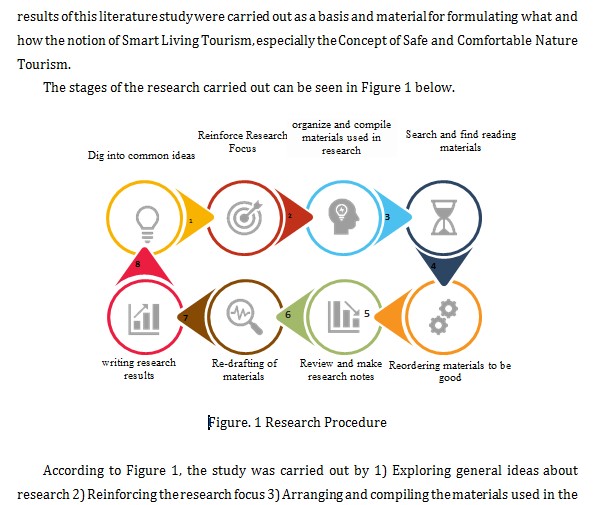Smart Living Tourism: Safe and Comfort Natural Tourism Concept
DOI:
https://doi.org/10.12928/jampe.v2i2.7907Keywords:
Recreations , Tourism Economics , Natural ResourcesAbstract
This research is a literacy study about smart living tourism in Indonesia. The aim is to find out the opportunities that smart living tourism has to develop through a review of existing literature. This study uses a descriptive and qualitative methodologies. Researchers try to uncover and understand something behind phenomena that have not been known before so that they can provide complex details about phenomena that are difficult to uncover in previous research. The result is smart living tourism Indonesia has a wide opportunity as a new nature tourism entity. With the existence the usage of websites, social media, and the internet can speed up marketing and increase consumer convenience in consuming this tourism commodity because it is easy and fast. What's more, smart living tourism is very close to nature, adding to the variety of ways tourists can enjoy nature. The contribution of this article is to provide knowledge that the trend of mart living tourism is becoming quite promising as a way to increase income in the tourism sector by collaborating between lodging tourism and nature tourism.
References
Atiyat, D. (2021). Smart Tourism - Living Lab Approach. International Journal of Eco-Cultural Tourism, Hospitality Planning and Development, 4(1), 114-124.
Buhalis, D., & Amaranggana, A. (2015). Smart Tourism Destinations Enhancing Tourism Experience Through Personalisation of Services. Information, Communication, Technology, and Tour, 377-389. doi:10.1007/978-3-319-14343-9_28
Chang, S., & Smith, M. K. (2023). Residents’ Quality of Life in Smart Cities: A Systematic Literature Review. Land, 876, 1-17. doi:https://doi.org/10.3390/land12040876
Diwyarthi, N. D., Pratama, I. W., & Eddy, I. W. (2023). Tourist Perspective Towards Glamping Accomodation in The Era of Industry 4.0 and Society 5.0. Jurnal Syntax Transformation, 4(1), 59-76. doi:https://doi.org/10.46799/jst.v4i1.672
Hanum, F., Suganda, D., Muljana, B., Endyana, C., & Rachmat, H. (2020). Konsep Smart Tourism Sebagai Implementasi Digitalisasi di Bidang Pariwisata. Journal Sustainable, Tourism, and Research, 3(1), 14-17.
Juarsa, C. A. (2020). Konsep Smart-Living untuk Meningkatkan Produktivitas Karyawan. Retrieved June 25, 2023, from https://binus.ac.id/malang/2020/09/konsep-smart-living-untuk-meningkatkan-produktivitas-karyawan/
Junior, A. S., Garcia, F. A., Morgado, P., & Filho, L. M. (2020). Residents’ Quality of Life in Smart Tourism Destinations: A Theoretical Approach. Sustainable, 39(2), 1-24.
Lee, H., & Hlee, S. (2021). The Intra- and Inter Regional Economic Effect of Smart Tourism City Seoul: Analysis Using a Input-Output Model. Sustainability, 13(7), 4031. doi:https://doi.org/10.3390/su13074031
Lee, P., Hunter, W. C., & Chung, N. (2020). Smart Tourism City: Developments and Transformations. Sustainability, 12(3958), 1-15. doi:http://dx.doi.org/10.3390/su12103958
Li, Y. (2017). Individuals’ Motivations to Adopt Smart Technologies for Tourism - Discrepancy Between Initial and Post Adoption. International Conference on Distributed, Ambient, and Pervasive Interactions, 77-92. doi:https://doi.org/10.1007/978-3-319-58697-7_6
Matos, A., Pinto, B., Barros, F., Martins, S., Martins, J. L., & Oliveira, M. A.-Y. (2019). Smart Cities and Smart Tourism: What Future do They Bring? World CIST, 932, 258-370. doi:https://doi.org/10.1007/978-3-030-16187-3_35
Mello, J. C., & Faxina, F. (2021). Smart City and Smart Tourist Destinations: Learning from New Experiences in the 21st century. International Journal for Innovation Education and Research, 9(5), 369-381. doi:http://dx.doi.org/10.31686/ijier.vol9.iss5.3102
Muliarto, H. (2015). Konsep Smart City Smart Mobility. Bandung: Institut Teknologi Bandung.
Ningrum, L., & Mustika, A. (2019). Is The City Society Interested in Staying at Rural Homestay in Indonesia? International Joirnal Innovation Science, Research, and Technology, 4(7), 228-234.
Serra, F. F., Neuhofer, B., & Ivars-Baidal, J. A. (2019). Towards a Conceptualisation of Smart Tourists and Their Role Within The Smart Destinantion Scenario. The Service Industries Journal, 39(2), 109-133. doi:http://dx.doi.org/10.1080/02642069.2018.1508458
Widjaja, A. E., Hery, H., & Tarigan, R. E. (2017). Meningkatkan Potensi Pariwisata Danau Toba Melalui Konsep Smart Tourism: Aplikasi dan Tantangannya. Seminar Nasional Inovasi dan Teknologi Informasi, 1-6.

Downloads
Published
Issue
Section
License
Copyright (c) 2023 Lustina Fajar Prastiwi, Sri Handayani, Sunil Kumar Chaudary

This work is licensed under a Creative Commons Attribution-ShareAlike 4.0 International License.












